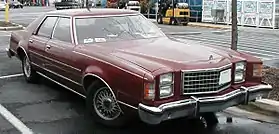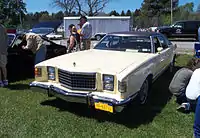Ford LTD II
The Ford LTD II is an automobile that was marketed and produced by Ford Motor Company between 1977 and 1979 in the United States and Canada. Deriving its name from the full-size Ford LTD model line, the intermediate LTD II consolidated the Ford Torino and Gran Torino model lines, with the Ford Elite replaced by the Ford Thunderbird. Offered in a two-door sedan, four-door sedan, and station wagon, the LTD II also served as a basis for the final generation of the Ford Ranchero coupe utility.
| Ford LTD II | |
|---|---|
 Ford LTD II S four-door sedan | |
| Overview | |
| Manufacturer | Ford |
| Also called | Ford Fairlane (Venezuela) |
| Model years | 1977–1979 |
| Assembly | Lorain, Ohio Atlanta, Georgia Pico Rivera, California |
| Body and chassis | |
| Class | Mid-size/Intermediate |
| Body style | 2-door coupe 4-door sedan 4-door wagon |
| Layout | FR layout |
| Related | Ford Ranchero Ford Thunderbird (1977–1979) Mercury Cougar |
| Powertrain | |
| Engine |
|
| Transmission | 3-speed Ford C4 automatic 3-speed Ford FMX automatic 3-speed Ford C6 automatic |
| Dimensions | |
| Wheelbase | 114 inches (2,896 mm) (coupe) 118 inches (2,997 mm) (sedan/wagon) |
| Length | 215.5 inches (5,474 mm) (coupe) 219.5 inches (5,575 mm) (sedan) 223.1 inches (5,667 mm) (wagon) |
| Width | 78.0 in (1,981 mm) |
| Height | 52.6 inches (1,336 mm) (coupe) 53.3 inches (1,354 mm) (sedan) 54.9 inches (1,390 mm) (wagon) |
| Chronology | |
| Predecessor | Ford Torino Ford Elite |
| Successor | Ford Granada (in 1980) |
During its production, the Lincoln-Mercury Division sold the LTD II under the Mercury Cougar badge, replacing the Mercury Montego.
The design of the Ford LTD II is notable as one of the largest vehicles ever produced as an intermediate, released just as the entire American auto industry began a period of downsizing. In terms of exterior footprint compared to full-size sedans, the LTD II is longer in length and wheelbase and wider than the later Ford LTD Crown Victoria, Ford Crown Victoria, Ford Five Hundred, and the Ford Taurus (fifth, sixth, and seventh-generation versions)
Background
.jpg.webp)
For the 1977 model year, Ford Motor Company made substantial revisions to its intermediate segment product lines involving both the Ford and Mercury brands. As part of the model changes, several product lines were given mid-cycle updates. To further revive interest, other model lines were consolidated to reduce internal competition and overlap.
Central to the model revision was the discontinuation of the Ford Torino, Gran Torino, and Ford Elite. While the Torino chassis and body was given an extensive update to extend its lifespan, the Torino/Gran Torino became the Ford LTD II ("II" to distinguish the intermediate model line from the full-size LTD). Alongside a massive exterior update, the Ford Elite became the Ford Thunderbird, allowing Ford to better compete against the Chevrolet Monte Carlo (and its various General Motors counterparts) and the Chrysler Cordoba, reducing potential overlap between the Thunderbird and the Continental Mark V.
As Ford discontinued the Torino, Mercury replaced the Montego, as it expanded the Mercury Cougar nameplate to its entire intermediate line (with the previous Cougar becoming the highest-trim Cougar XR7 counterpart of the Thunderbird).
Design overview
Chassis
The LTD II utilizes the body on frame construction shared with the 1972-1976 Torino/Montego. As with the LTD, the LTD II utilized a full perimeter frame; to isolate road shock from the body, the frame was fitted with fourteen rubber body mounts and five cross members. On the rear suspension, the four-link solid rear axle utilized coil springs.
The LTD II derived much of its powertrain line from the 1974 Torino, with one exception: in the interest of fuel economy, the 460 V8 was dropped from all Ford and Mercury intermediates, with the 302 V8 making its return as the standard engine (outside of California). As options, Ford offered the 351M V8 and the 351 Windsor V8, with a 400 cubic-inch V8 serving as the largest engine offering. For 1979, the 400 V8 was discontinued.
Body
Although the transition from the Torino to the LTD II is theoretically a mid-cycle update, Ford stylists would make several styling changes to introduce the new model line, moving away from the Coke-bottle styling that dominated the exterior of its Torino/Montego predecessor.
Though limited funds precluded a complete redesign of the exterior, the roofline and all sheetmetal from the doors rearward were given an extensive update. Adopting much of the design language of the redesigned Thunderbird, the roofline was given larger, straight-edged windows (including optional opera windows) and a level beltline while the body retained relatively large fender flares.
The LTD II carried over the use of the Elite's hood and front fenders with a restyled front end panel adapting vertically stacked rectangular headlamps and a new grille. The rear end adopted styling elements of the full-size Ford LTD. Due to the cost of redesigning the rear quarter side panels, the LTD II station wagon was produced with sheet metal nearly unchanged from the earlier Mercury Montego line; the station wagon was discontinued after 1977.
The LTD II was produced in three trim levels, base-trim "S", standard-trim, and the luxury-minded LTD II Brougham. Bucket seats with console and floor shifter were available on base- and Brougham-level coupes.
- 1977-1979 Ford LTD II body configurations
 Ford LTD II Brougham four-door
Ford LTD II Brougham four-door Ford LTD II two-door
Ford LTD II two-door 1977-only Ford LTD II Squire station wagon
1977-only Ford LTD II Squire station wagon.jpg.webp) 1977-1979 Ford Ranchero in Squire trim
1977-1979 Ford Ranchero in Squire trim
Discontinuation
Although initially popular, sales of the LTD II declined rapidly due to several factors. As the LTD II made its 1977 debut, Chevrolet introduced downsized versions of the Chevrolet Impala and Caprice; although the LTD II was marketed as a competitor against the Chevrolet Malibu, the intermediate LTD II presented with a larger exterior footprint than the Impala (though with a smaller interior). The downsizing of the General Motors full-size line was met with success, with the Impala/Caprice becoming the best-selling 1977 model line. Also, internal competition from its nearly identical platform mate the newly downsized Thunderbird (with its much lower base price) deflected sales from the LTD II two-door models.
For 1978, the LTD II met a much larger degree of competition, as Ford introduced the Ford Fairmont as the replacement for the long-running Ford Maverick. Though officially considered a compact (nearly two feet shorter and seven inches narrower than the LTD II), the interior dimensions of the Fairmont entered close enough into the midsize segment as downsizing extended beyond full-size vehicles. Along with its slow sales, the potential for model overlap with the Fairmont led to the discontinuation of the LTD II station wagon.
For 1979, the LTD II effectively became obsolete as Ford introduced the downsized Ford LTD. In comparison to the LTD II, the downsized LTD was 11 inches shorter in length and 4 inches shorter in wheelbase, an inch narrower, and 500 pounds lighter; despite the smaller exterior footprint, the LTD rivaled its full-size predecessor in interior space.
As the Thunderbird and Mercury Cougar were downsized to the Ford Fox platform for 1980, the Ford Torino chassis was discontinued after 1979. After 1979, the Ford Ranchero was indirectly replaced by the Ford Ranger, as the coupe utility pickup segment was phased out in favor of compact pickup trucks in the United States. After its 1979 discontinuation, the Ford LTD II never saw a direct successor in the Ford product line. In 1983, the Ford LTD model name returned to the mid-size segment, with Ford renaming the Granada as part of a mid-cycle redesign. After 1986, this vehicle was replaced by the Ford Taurus, largely marking the end of Ford LTD nameplate in North America.
Venezuela
Ford manufactured the LTD II in Venezuela badged as the Fairlane and Fairlane 500. All three body styles were available.